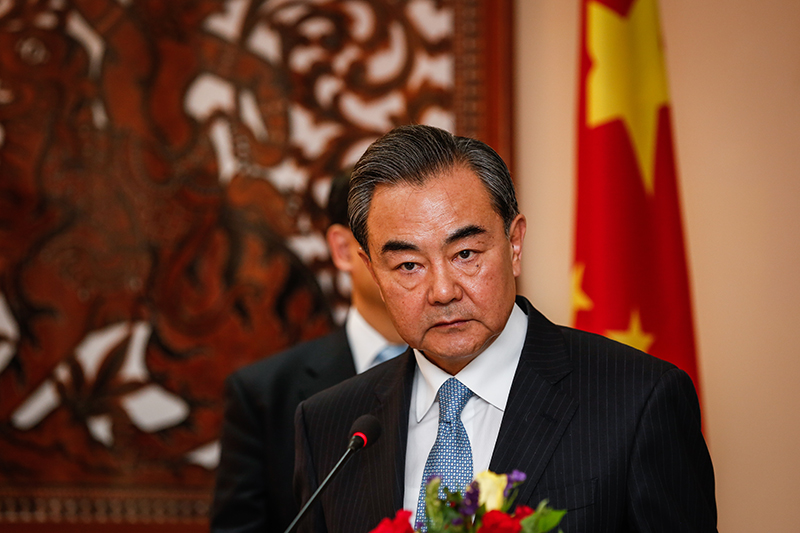New Foreign Minister Prak Sokhon wasted no time in heaping praise on Cambodia’s largest donor on Friday as his Chinese counterpart arrived in the country for an official visit—the first since Mr. Sokhon took over from Hor Namhong last month.
Standing alongside Chinese Foreign Minister Wang Yi at a press conference in Phnom Penh, Mr. Sokhon spoke of Cambodia’s historical allegiance with the Asian superpower and reiterated the importance of further strengthening ties between the two nations.

“We both have the same vision and highly value our relationship —one that that goes back for a long time between both our countries,” Mr. Sokhon said.
“It is a relationship that was created by our late king [Norodom Sihanouk] and with former leaders of China…. This relationship was strengthened and expanded by Samdech Techo Prime Minister [Hun Sen],” he said.
The pair discussed the South China Sea dispute, a conflict that has seen Cambodia face heavy criticism for being perceived as siding with China in its territorial wrangling with a number of Asean countries with competing claims to clusters of islands and swaths of ocean.
As chairman of Asean in 2012, Cambodia was accused of blocking the use of strong language against China regarding the conflict, and the association failed to release a joint communique following the event—a first.
“Cambodia still maintains a neutral stance,” Mr. Sokhon said on Friday.
“The stance of Cambodia has always been to appeal to all sides involved to make efforts to solve the dispute through peaceful means,” he said. “If all countries respected these principles like Cambodia, we would not have problems.”
For his part, Mr. Wang stressed that China wanted to maintain peace amid the dispute, then leveled a barrage of criticism at the Philippines, which filed a case against China at the Permanent Court of Arbitration in The Hague over Beijing’s claim to parts of the sea.
“We are concerned that there are some powerful countries that use the South China Sea conflict to increase military activity in this area. These activities are not useful for stability and peace in the South China Sea,” Mr. Wang said through a translator.
“The lawsuit of the Philippines abused international law,” he added.
Carlyle Thayer, a Southeast Asia expert at the Australian Defense Force Academy in Canberra, said Cambodia’s continued efforts to cement its allegiance with China—the country’s single-largest provider of external assistance since 2010—was hardly surprising.
“The US, EU and Vietnam have long accepted Cambodia’s role as sycophant in its relations with China. Cambodia relies on China for aid, trade and investment. In international relations parlance Cambodia is bandwagoning with China in the expectation of rewards,” Mr. Thayer said in an email.
“Cambodian leaders have never pondered the ‘what if’ question: when Vietnam invaded Cambodia and if the Philippines took the position that it was a bilateral matter and not one for ASEAN, where would the Cambodian leaders be today? Either dead under the Khmer Rouge or subjects in a state dominated by Vietnam.”




